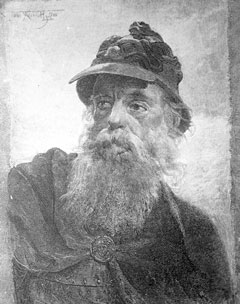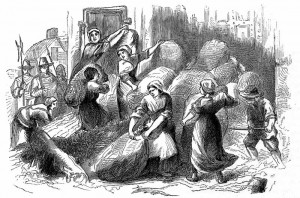Related Research Articles

Nathaniel Fiennes was a younger son of the Puritan nobleman and politician, William Fiennes, 1st Viscount Saye and Sele. He sat in the House of Commons at various times between 1640 and 1659, and served with the Parliamentarian army in the First English Civil War. In 1643, he was dismissed from the army for alleged incompetence after surrendering Bristol and sentenced to death before being pardoned. Exonerated in 1645, he actively supported Oliver Cromwell during The Protectorate, being Lord Keeper of the Great Seal from 1655 to 1659.

Waldegrave is the name of an English family, said to derive from Walgrave in Northamptonshire, who long held the manor of Smallbridge in Bures St. Mary, Suffolk.

Oughterard is an ecclesiastical hilltop site, graveyard, townland, and formerly a parish, borough and royal manor in County Kildare, nowadays part of the community of Ardclough, close to the Dublin border. It is the burial place of Arthur Guinness.

Somerset Lowry-Corry, 2nd Earl Belmore, styled The Honourable from 1781 to 1797 and then known as Viscount Corry to 1802, was an Irish nobleman and politician.
Thomas Belchiam (1508–1537) was an English Franciscan who died in Newgate Prison in the reign of Henry VIII. He is a Catholic martyr, declared venerable by Pope Leo XIII. The year of death is in question: the Victoria County History for Kent puts the events in 1534. It references Thomas Bourchier's Historia Ecclesiastica de Martyrio Fratrum..., "though the writer assigns them to 1537". Dom Bede Camm, O.S.B., places Belchiam's date of death as 3 August 1537. Notes and Queries lists him as dying in 1538.
This is a list of Civic Sheriffs and High Sheriffs of the County of the City of Bristol, England.
The High Steward in the universities of Oxford and Cambridge is a university official. Originally a deputy for the Chancellor, the office of High Steward had by the 18th century undergone the same evolution and become a position by which the universities honoured prominent external figures. The High Stewards still retain some functions relating to adjudication in disputes, appeals, and deputizing if there is a vacancy in the Chancellorship. In Oxford, the office of High Steward is now more similar to the office of Commissary in Cambridge.

Sir Bourchier Wrey, 6th Baronet of Tawstock, Devon, was a Member of Parliament for Barnstaple, Devon, in 1747–1754. The manor of Tawstock, about two miles south of Barnstaple, had been since the time of Henry de Tracy the residence of the feudal barons of Barnstaple, ancestors of the Wrey family.

William Winstanley was an English poet and compiler of biographies.

In the Kingdom of England, the title of Secretary of State came into being near the end of the reign of Queen Elizabeth I (1558–1603), the usual title before that having been King's Clerk, King's Secretary, or Principal Secretary.
William Wadsworth was an early pioneer of New England, a founder of Hartford, Connecticut and the patriarch of numerous and prominent Wadsworth descendants of North America, including the poet Ezra Pound.
The High Sheriff of Fermanagh is the Sovereign's judicial representative in County Fermanagh. Initially an office for lifetime, assigned by the Sovereign, the High Sheriff became annually appointed from the Provisions of Oxford in 1258. Besides his judicial importance, he has ceremonial and administrative functions and executes High Court Writs.
Samuel Bury (1663–1730) was an English Presbyterian minister.
Robert Yeamans or Yeomans was an English merchant of Bristol who in early 1643 plotted with other Royalists to aid in the capture of Bristol by the Royalists. The plot was discovered by the parliamentary governor Nathaniel Fiennes and Yeomans was tried as a traitor, found guilty by court-martial and executed.
Sir Timothy Fetherstonhaugh was an English royalist during the English Civil War.

The Battle of Falmouth involved Joseph-François Hertel de la Fresnière and Baron de St Castin leading troops as well as the Wabanaki Confederacy in New Brunswick to capture and destroy Fort Loyal and the English settlement on the Falmouth neck, then part of the Massachusetts Bay Colony. The commander of the fort was Captain Sylvanus Davis. After two days of siege, the settlement's fort, called Fort Loyal, surrendered. The community's buildings were burned, including the wooden stockade fort, and its people were either killed or taken prisoner. The fall of Fort Loyal (Casco) led to the near depopulation of Europeans in Maine. Native forces were then able to attack the New Hampshire frontier without reprisal.

During the English Civil War (1642–1651), Bristol was a key port on the west coast of England and considered strategically important by both Royalists and Parliamentarians. Initially, the leadership of Bristol wanted to keep the city neutral in the conflict. In 1642, city officials implored Thomas Essex not to occupy the city with his Parliamentarian forces. The city was weakly defended, and Essex entered without much resistance. During the conflict, Bristol was used as a receiving point for the Royalists to accept reinforcements from Ireland. The town was well fortified by the Frome and Avon rivers, as well as a medieval castle, which had been bought by the corporation when the First English Civil War broke out in 1642, and during the Parliamentary defense, earthen artillery forts.
Thomas Salmon (1679–1767) was an English historical and geographical writer.
John Corry was an Irish topographer and historian writer. Among his other works he wrote and published The Life of George Washington, first published in 1800.

Dorothy Hazzard formerly Dorothy Kelly was an English Baptist leader in Bristol. She was a leading defender of the city when it came under attack by the Royalists.
References
- Corry, John; Evans, John (1816). The History of Bristol, Civil and Ecclesiastical: Including Biographical Notices of Eminent and Distinguished Natives. Vol. 1. W. Sheppard. p. 409,410.
- Dictionary of National Biography, Errata. 1904. p. .
- Salmon, Thomas (1730). Emlyn, Sollom (ed.). A complete collection of state-trials, and proceedings for high-treason, and other crimes and misdemeanours: from the reign of King Richard II. to the end of the reign of King George I. With two alphabetical tables to the whole. Vol. 1 (2 ed.). J. Walthoe senior. p. 750.
- Attribution
 This article incorporates text from a publication now in the public domain : Cooper, Thompson (1886). "Bouchier, George". In Stephen, Leslie (ed.). Dictionary of National Biography . Vol. 6. London: Smith, Elder & Co. p. 4. The following are referenced in the DNB article:
This article incorporates text from a publication now in the public domain : Cooper, Thompson (1886). "Bouchier, George". In Stephen, Leslie (ed.). Dictionary of National Biography . Vol. 6. London: Smith, Elder & Co. p. 4. The following are referenced in the DNB article: - Clarendon's Hist. of the Rebellion (1843), 389;
- Lloyd's Memoires (1677), 565;
- Winstanley's Loyall Martyrology, 5;
- Granger's Biog. Hist. of England (1824), iii. 110;
- 'Barrett's Hist. of Bristol, 227, 228.